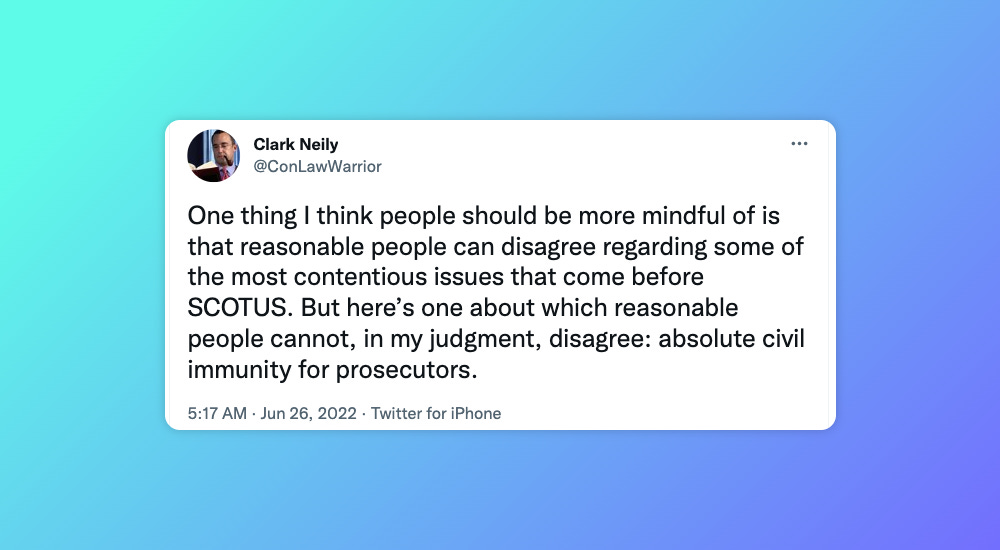Judicial Roundup with Cato's Clark Neily
The Supreme Court has been busy this month. Here's what you need to know
It’s been a busy month for the Supreme Court, with decisions coming down in several landmark cases. Of course, the Dobbs decision – reversing the right to an elective abortion found in Roe v. Wade – has dominated the headlines, but it’s not the only case we should be paying attention to.
I originally invited Clark Neily – Senior Vice President for Legal Studies at the Cato Institute – to discuss his essay on the libertarian (non-)position on abortion, both from a moral and legal standpoint. It’s probably impossible to make everyone happy with such a discussion, yet Clark and his co-essayist Jay Schweikert do an excellent job threading the needle on what they call “the hard problem of abortion” (read the whole thing).
They write:
“Libertarianism tolerates a wide range of views on the policy question of abortion access.”
But the policy question is only the beginning. The Constitutional question is what the Supreme Court took up in Dobbs, and while the outcome may anger the pro-choice side, Neily and Schweikert point out that “there are still many valid grounds to criticize how the Court has constitutionalized abortion rights in particular.” [emphasis added]
This is a key point missing from most headlines.
The Dobbs decision reverses Roes classification of abortion among our unenumerated rights, and holds that the question of individual liberty isn’t so straightforward where the unborn are concerned.
What makes abortion different from other “unenumerated rights” affirmed by the court in the modern era, like contraception, parental rights over their child’s education, or the right to privacy in the bedroom? We'll get to these delicate questions on Sunday, but I also want to discuss an area where the Court has opted not to reconsider a prior decision that appears to be in error.
The doctrine of qualified (and civil) immunity, which the Cato Institute characterizes as an “Unlawful Shield,” protects prosecutors, police officers and other government officials from civil and criminal liability in cases where they violate people’s rights (intentionally or accidentally) in the course of doing their job.
While pundits endlessly argue about the legal reasoning in Roe, Neily and I will turn our attention to the judge-made law from the 1982 case of Harlow v. Fitzgerald, in which the Supreme Court made it harder to prosecute violations of individual rights perpetrated by members of the protected class known as government officials. Since then, the Court has refused to address substantial violations of liberties resulting from its reinterpretation of a 150-year-old statute. Just this past week, the Supreme Court dismissed two more cases in which they could have course corrected.
Although I first covered the topic in 2020, and Neily has been continuing the fight to “#AbolishQI,” it still doesn't get nearly enough attention. You can read the transcript of my previous show here.
Join me and the "Constitutional Law Warrior" live this Sunday, 8-9 am PACIFIC/11-12 pm ET.
As always, your calls are welcome at (424) BOB-SHOW.
LINKS:
@ConLawWarrior - Follow Clark on Twitter
Unlawfulshield.com - Cato’s project to #AbolishQualifiedImmunity
The Hard Problem of Abortion Rights, JUNE 24, 2022, By Clark Neily and Jay Schweikert





